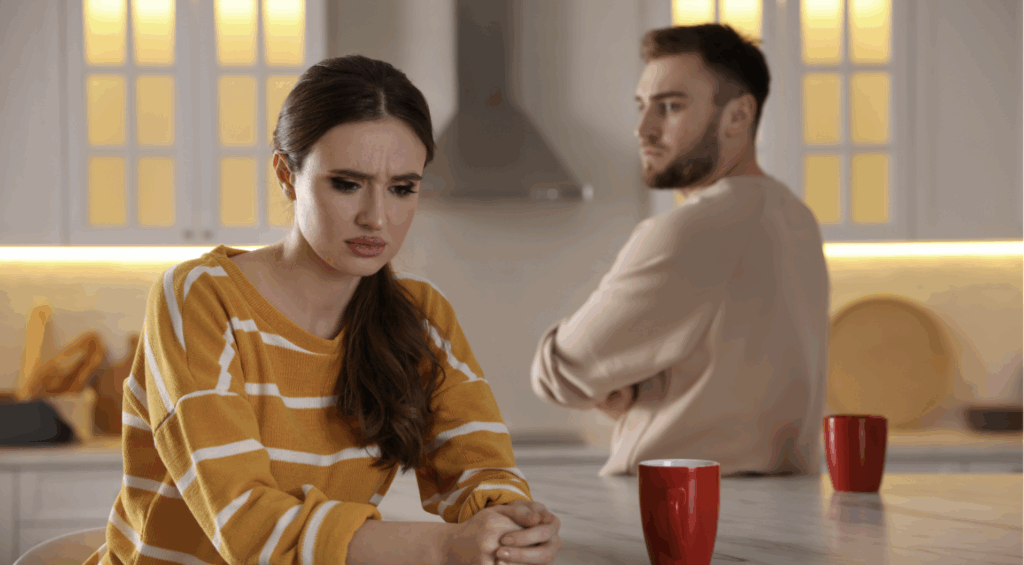In relationships, we often find ourselves caught in the same arguments over and over again. We may feel stuck in a cycle of criticism, defensiveness, or withdrawal, unsure of how to change the pattern. Why does this happen, and more importantly, how can we break these negative cycles?
In a recent episode of the Roadmap to Secure Love podcast, Kimberly Castelo and Kyle Benson explored how our first response in conflict is often shaped by our family of origin and past experiences. However, the real power in relationships lies in making space for our second response—the intentional choice that reflects the person we want to be in our relationship.
If you’ve ever thought, “Why do we keep having the same fight?” or “Why do I react this way in relationships?”—this episode is for you. Let’s dive into the key takeaways from the conversation and how you can start breaking negative cycles in your own relationship.
Why Do Negative Cycles Keep Repeating?
Many couples experience predictable and repetitive conflict cycles that feel impossible to break. One partner may lash out in frustration, while the other becomes defensive or withdraws. This leads to more disconnection, reinforcing the very fears that started the conflict in the first place.
According to attachment theory, our reactions in relationships are deeply influenced by our early experiences. These patterns, also known as first responses, are often automatic, reactive, and shaped by past relationships—especially those with our caregivers.
For example:
- If you grew up in a home where expressing emotions was discouraged, your first response in conflict may be to shut down.
- If you experienced criticism or high expectations, your first response might be to defend yourself or over-explain to avoid rejection.
- If conflict in your childhood home felt threatening, you might automatically react with anger or criticism to protect yourself.
But here’s the good news: while these first responses are deeply ingrained, they do not have to define how you respond in your relationship today.
The Power of the Second Response
One of the most valuable insights from the Roadmap to Secure Love podcast is the idea of the second response—a response that isn’t driven by old wounds but by conscious choice.
Your first response is automatic. Your second response is intentional.
Kyle shares how, early in his marriage, he and his wife struggled with recurring conflicts. But he learned to pause, reflect, and reframe his reaction before responding. Instead of reacting with frustration, he started to ask himself:
What am I really feeling beneath my anger?
What do I actually need from my partner?
How can I communicate this in a way that brings us closer instead of pushing us apart?
The shift from reacting to responding can transform the way couples communicate. When both partners make space for their second response, they create a relationship dynamic built on understanding, support, and emotional security.
Challenges in Breaking Negative Cycles
While learning to respond differently is powerful, it doesn’t happen overnight. There are three major challenges that often come up when couples try to break negative cycles:
1. It’s Hard to Slow Down in the Heat of the Moment
In the middle of an argument, our nervous system is activated, making it difficult to pause and choose a different response. This is why it’s important to practice emotional regulation—taking deep breaths, stepping away for a moment, or even using a simple phrase like “Let me try that again.”
2. It Can Be Hard to Trust Your Partner’s Growth
If your partner has reacted negatively in the past, you might struggle to believe their second response is real. You may think, “How do I know this time is different?” Trust takes time, but when both partners show up consistently, growth becomes possible.
3. Unlearning Old Patterns Takes Practice
Changing the way you communicate is like building a new muscle—it takes repetition and effort. It’s okay if you don’t get it right the first time. What matters is that you keep trying and create an environment where both partners feel safe to grow.
Key Takeaways from the Podcast
If you’re looking for a roadmap to breaking negative cycles in your relationship, here are the key takeaways from this episode:
✔️ Your first response is automatic, but your second response is a choice.
✔️ Express needs instead of blame. Instead of saying, “You never help!” try “I’m feeling overwhelmed. Can you take care of this?”
✔️ Make space for your partner’s growth. If they are working on responding differently, acknowledge it instead of assuming they won’t change.
✔️ Recognize the real emotions behind your reaction. Anger is often a mask for deeper feelings like hurt, fear, or insecurity.
✔️ Support each other’s efforts to change. Relationships grow stronger when both partners encourage each other’s second response.
Breaking Negative Cycles Starts Today
If you and your partner have been feeling stuck, remember—it’s never too late to shift the way you communicate. By recognizing your first response, pausing, and making space for a new response, you can transform the way you connect and create a more secure, fulfilling relationship.
Want to dive deeper into attachment, emotional connection, and relationship healing?
Follow The Roadmap to Secure Love on Apple, Spotify, and YouTube.
Sign up for The Secure Attachment Path course to learn practical tools for building secure connections. (Link in the show notes.)
Until next time, stay connected and keep listening with love.

